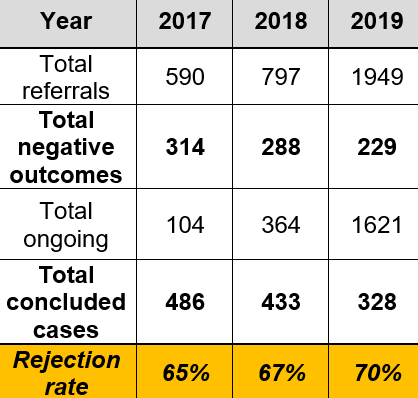Two in three modern slavery referrals made by foreign nationals in detention that were concluded between 2017 and 2019 were rejected. This rejection rate increased from 65% in 2017 to 70% in 2019.
Table 1- Outcomes of modern slavery referrals from detention (HO analysis, Mar 2021).

The news comes as the Home Office revealed it is considering measures to tackle an ‘alarming rise in abuse of the modern slavery system, with major increases in child rapists, people who threaten national security and failed asylum seekers clogging up modern slavery system’ (see statement by the Home Office).
Alp Mehmet, chair of Migration Watch UK, was quoted in the Daily Telegraph (here): “Modern slavery and people trafficking are abominable crimes and we must go to the aid of victims. But we must also recognise that measures aimed at helping such people are now being abused by those who simply want to avoid removal. Dangerous foreign criminals must not be allowed to get away with exploiting what appears to have become a gap in our defences.”
These particular statistics relate to migrants who have been detained i.e. foreign nationals residing in the UK without permission. Total number of referrals by those detained either following immigration offences or as foreign national offenders has gone up from about 600 in 2017 to just under 2,000 in 2019 (more than tripling).
- The rejection rate of referrals made in detention in 2017 was 65% (314 out of 486 concluded).
- The overall rejection rate in 2019 was 70% (229 out of 328 total concluded cases).
- Interestingly the rejection rate was higher for those detained following immigration offences than for foreign national offenders (68% versus about 62% when both years averaged).
- The rejection rate across entire period (2017,2018 and 2019) was 67% (831 out of 1,247 concluded).
So about two in three referrals of those cases which have been concluded have been ruled to be unfounded.
As for the wider figures of all referrals, not just those in detention, 2,200, or 56% of nearly 3,900 cases opened in 2018 which had been ruled on as of July 2019 were deemed as not having potential or conclusive grounds for being trafficked (see our brief).
